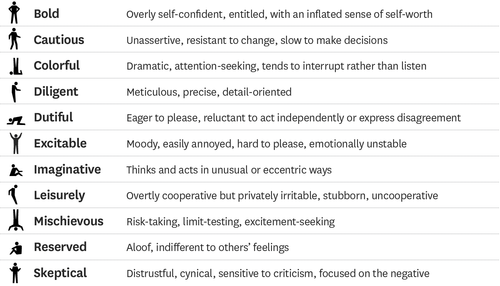I had the honour of presenting to the Young Professional Network of the Institute of Public Administration Australia, NSW on how they could future proof there careers in the public service. To prepare for the event, I spoke to old colleagues and reflected on my career to uncover the things that we wished we’d known at the start of our careers. I came up with four tips which I believe are critical to ensure your career success.
1. Don’t let fear hold you back
Have you ever let fear stop you from doing something or achieving something, whether professionally or personally? I think this is pretty much universal for all of us.
I’ve worked with hundreds of senior executives who are applying for roles, or they might be in the middle of a career transition. One thing that has stood out to me about the small group of people who are at the top of their game is that they haven’t had a detailed and structured career plan. Instead, they have jumped at opportunities when presented with them, and the majority of them have actively sought out these opportunities. Sometimes this has taken them away from their core profession, but it the broad exposure and experience that they’ve gained that have helped accelerate their career. So, don’t let fear stop you from doing something that feels uncomfortable. Take that secondment opportunity, ask to work on the new project, put yourself in situations where you can confront and overcome the things make you feel uncomfortable.
2. Understand yourself, especially your derailers
To effectively progress in your career, and if you have senior leadership aspirations, then I think fostering self-awareness and emotional intelligence is essential.
But what does that mean? Well, having self-awareness is about having a thorough understanding of our skills, values, interests and importantly, our limitations. It’s about understanding how we feel and know why we behave in particular ways. Most importantly, people with self-awareness know how their behaviour impacts on those around them.
In general, we tend to be good at identifying our strengths, but what I’ve noticed from working with leaders is that they tend to do a pretty poor job of evaluating their derailers, particularly as they gain power and move up within an organisation. Some leaders believe that their progression and success vindicates these not so desirable traits. Eventually, though, they can derail themselves, their teams and even their organisations without self-awareness around their limiting behaviours. I often see that many people who referred to coaching are to help bring awareness to these areas.
What is a derailer?
Two decades ago, two psychologists created an inventory of 11 “dark side” traits. After they profiled millions of employees, managers, and leaders, their research found that most of us display at least three of these dark-side traits. Now, these traits don’t manifest every day, but they will in stressful situations or where we’ve become complacent. So I think it’s essential for you to bring some awareness to what yours may be.
For example, cautious leaders may convey the illusion of control and risk management in the short term, but being overly cautious may cause them to be so risk-averse that they obstruct progress and innovation. Being excitable may help you display passion and enthusiasm to coworkers and team, but it can also make you volatile and unpredictable, which is taxing to others. Diligence helps you pay attention to details and strive to produce quality work, yet in excess, it can morph into procrastination and obsessive perfectionism.
Increasing your self-awareness is a continuous process, and you will need to commit to it throughout your entire career. It is not one book you can read, and you won’t one day have woken up and “achieved” self-awareness. But if you are willing to commit to a continuous process of self-exploration, then you will position yourself well for your future career. There are a few things you can do to increase your self-awareness and avoid your derailers.
How to avoid derailers
- Explore yourself and analyse your past experiences, spend time to get clear on your values and also try and understand your capabilities and gaps.
- Work with a career coach or a mentor can be useful here and will allow you to benefit from the experience of a senior leader who has been in similar situations.
- Ask others for feedback – friends, family members and colleagues. They will all see you differently. And be open-minded, especially if what they see conflicts with how you see yourself.
3. Get social and build your brand
When I started my career in the public service in 2002, there was no such thing as LinkedIn or Yammer or any social media for that matter. At the time, I was with the Brisbane City Council, and we had just over 12,000 employees there, so standing out from the crowd and building a relationship with the senior executive wasn’t easy.
There are now so many ways that you can build your brand, inside and outside your agency. Many senior executives across a variety of sectors use social media, with LinkedIn and Twitter being the primary channels. I connect with these people every day through these tools to help build the brand of my business. Now, I’m not suggesting you spend your life on LinkedIn, but targeted networking and relationship building will help you build your brand and accelerate your career.
How can you use these social channels for success?
- Make sure your profile is up to date and complete, share your achievements and show a visitor to your profile who you are and what you stand for. To help with this, read our top tips to update your LinkedIn profile for 2021.
- It would help if you also were visible by sharing your point of view. Share your work in status updates or interesting content you’ve read. Comment and engage with other people’s posts. You can also create content for a personal blog or your LinkedIn page. Be consistent and spend some time in reflecting what you want to be known for – no one is an expert in everything.
- Finally, connect with relevant people, even if you don’t know them. Don’t be spammy but reach out to relevant people and let them know why you’re interested in what they do. Grow your network and in turn, grow your perspective and access to opportunity.
4. Don’t fear artificial intelligence
Finally, I speak to people pretty regularly who are worried that robots will replace their jobs. And, you know, people have feared that that technology advancement will lead to mass unemployment for a long time. For example, in the 16th century, Queen Elizabeth rejected a patent for a knitting machine for fear that it would deprive knitters of employment.
Technology, of course, has replaced some functions, but it has arguably created far more opportunities than it replaced. And it is these opportunities that I see for the public sector. So there are a few things that I’d recommend you do to take advantage of these opportunities when they come up.
- The first is Become tech fluent – you need to understand what artificial intelligence is, is machine learning and what the internet of things is. And more importantly you need to reflect on how these advanced technologies will impact your profession and your organisation;
- Get ready for life long learning – now, I don’t mean getting degree after degree, but you need to create a personal discipline of continuous learning and improvement, both formally and informally;
- And lastly you need to Hone your human skills – these are the skills where there will be both a demand and a shortage. In the future, skills like customer service, resolving conflicts, innovative thinking, problem-solving, strategy, written and verbal communication – these are the skills where there will be both a demand and a shortage.
So, in summary, what I hope you take from this article is that you need to know yourself and increase your emotional intelligence. Try not to let fear hold you back and take opportunities when they present themselves. You should also invest time to think about what your message is and then find opportunities to share those ideas and connect with others.



















